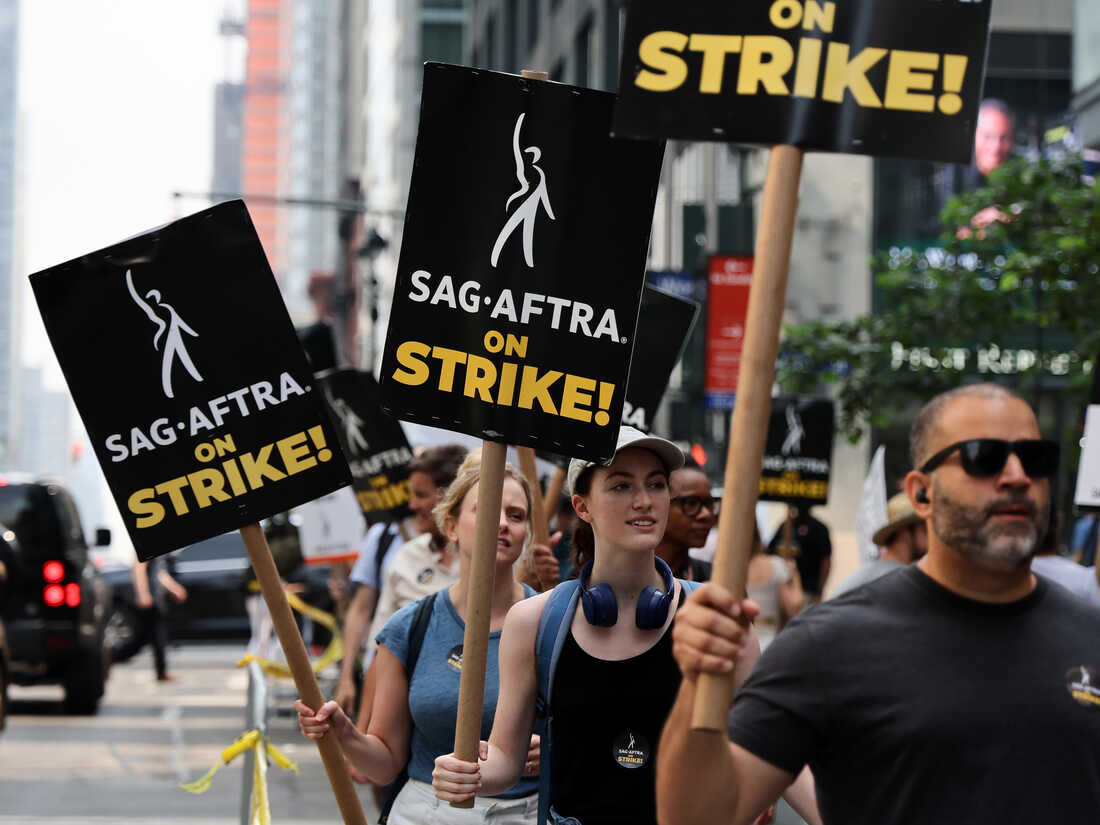Proud Moment for India as Kiran Rao’s Laapataa Ladies goes as an official entry for Oscars 2025! On Monday, September 23, 2024, the jury members of the Film Federation of India selected Laapataa Ladies as an official entry for the Oscars in the category of Best Foreign Film. Kiran Rao’s …
Striking Writers Get Invitations From Producers For Negotiations, Hinting At Breakthrough

Producers Reach Out To Striking Writers For Talks, Signaling Possible End To The Impasse
The Writers Guild of America (WGA) and Hollywood producers have requested a meeting to discuss the potential of restarting discussions; this is the first sign of movement in a deadlock that has lasted for almost 100 days.
After six weeks of talks with the Alliance of Motion Picture and Television Producers (AMPTP), an organization that represents major studios and production companies, failed, the WGA, which represents more than 11,000 film and television writers, went on strike on May 2.
The strike has had an impact on television shows and films, causing some to halt production or hire non-union writers. The writers are requesting more money for their work, particularly for streaming platforms and residuals.
According to a letter sent to the union’s members by the negotiating committee, Carol Lombardini, the AMPTP’s chief negotiator, asked to speak with the WGA on Friday, August 4. The letter read that the WGA is “always willing to listen” but that it remains “committed to our core principles and achieving a fair contract.”
The meeting is taking place as writers strike against the Screen Actors Guild-American Federation of Television and Radio Artists (SAG-AFTRA), which represents more than 160,000 actors, for better pay and working conditions.
The actors’ strike has increased pressure on the producers because it will effectively shut down Hollywood as the majority of film and television productions will immediately cease.
Since May 1, when negotiations between the WGA and the AMPTP broke down over significant issues like minimum wage rates, health insurance contributions, script fees, and streaming royalties.
The most recent significant Hollywood writers’ strike took place in 2007–2008 and lasted 100 days. It resulted in lower-quality scripts, fewer TV episodes, and delayed movie releases, all of which cost the industry an estimated $2.5 billion.
Demands Of The Writer
The Writers Guild of America is seeking higher compensation for writers across the board. Additionally, they want their health fund and pension plan to be increased. In addition, the guild wants more up-front payments to take the place of backend residuals. The union wants TV shows to staff a certain number of writers for a period of time. Additionally, the WGA wants shorter exclusivity agreements.
The WGA’s demands are as follows
- An increase in the base pay for all positions
- Higher residuals, especially for streaming platforms
- Minimum staffing requirements for TV shows
- Improved pension and health plans
- The regulation of artificial intelligence in scriptwriting.
Producers Objection
The AMPTP, which represents the producers, has raised objections to several of the WGA’s demands, including:
- The rise in streaming platform residuals, which, in their view, are insufficiently profitable to warrant higher payments
- They assert that the minimum staffing requirements for TV shows would restrict their creative flexibility and raise costs.
- They consider it to be an infringement of their intellectual property rights to regulate artificial intelligence in scriptwriting.
Wrapping Things Up
The strike is a first step toward resolving scriptwriters’ concerns and recognizing their rights. However, both the WGA and the AMPTP must continue to engage in open communication and talks to secure a long-term and mutually beneficial accord. This will assist not just the writers, but also the entire growth and success of the entertainment sector.
Latest New
Amidst the chaos, the 55-year-old actress was seen having some me time with her kids. The recent IG post of the megastar is proof of the same. The post not only shows her daily activities but also shares a cryptic message for her ex-husband Ben Affleck. The snaps included a …
Suhani Bhatnagar, the Dangal Actress Who Portrayed Young Babita Phogat, Passes Away at Age 19: Verified by Aamir Khan Productions 19-year-old actress Suhani Bhatnagar, who gained fame for her part in the popular movie Dangal, passed away. In Dangal, Suhani was portrayed as Aamir Khan’s daughter. Suhani Bhatnagar, who portrayed …
Return Of Brad Pitt To The Cast Of The Movie Critic The writer/director has repeatedly stated that Brad Pitt will return to the cast of Quentin Tarantino’s upcoming film, “The Movie Critic” and this will be his last & final picture. For the movie, he’s reconnecting with Tarantino, according to …
Heidi Klum shows her Halloween outfit for 2023. For Halloween 2023, supermodel Heidi Klum donned a flashy peacock costume. Supermodel Heidi Klum has unveiled a breathtaking exhibition of ingenuity and flamboyance by donning a painstakingly created peacock costume for her much anticipated Halloween party, following much hoopla, suspense, and teases. …
The Rick and Morty Season 7 Trailer Unveils Justin Roiland’s Replacement Voice Actors Until the US premiere of the upcoming season, the new voice actors remained a secret. With the US premiere of Rick and Morty season 7, the voice actors who will be taking Justin Roiland’s place as co-creator …
According to reports, Netflix plans to raise its prices once the current Hollywood actors’ strike is over. According to the source, the price rise would first become effective in the US and Canada before moving elsewhere. As soon as the current Hollywood actor strikes conclude, Netflix is apparently aiming to …
In Canada, Disney+ will launch a crackdown on password sharing this November. It will soon be illegal for subscribers in Canada to share their accounts with others outside of their homes. On November 1st, Disney+ in Canada will start limiting password sharing. The region’s subscribers were informed through email that …
Day 2 box office results for Fukrey 3: Richa Chadha, Varun Sharma, Manjot Singh, and Pulkit’s movie bring in a total of 16.32 crore. The movie Fukrey 3 starring Richa Chadha, Varun Sharma, Manjot Singh, Pulkit Samrat, and Pankaj Tripathi is doing well at the box office. Box office earnings …
Alia Bhatt will appear in Vasan Bala’s upcoming film, Jigra, and will stop at nothing to keep her brother safe. view the news release video With Vasan Bala’s Jigra, Alia Bhatt will return to the big screen in September of next year. Her own Eternal Sunshine Productions produced the movie. …










